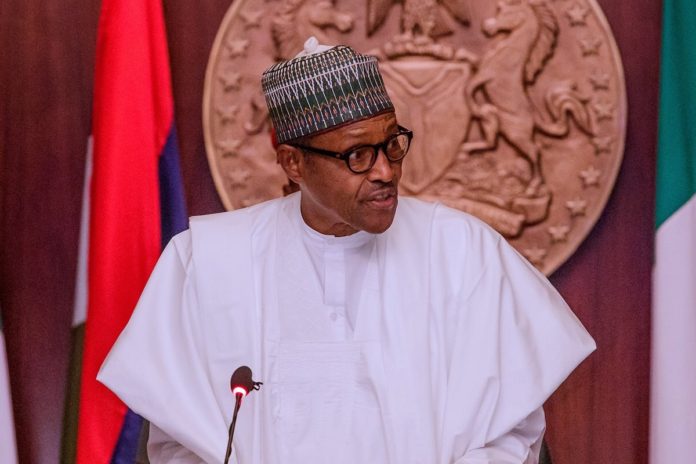October 22 — Nigerians hoping for some contrition from their government were left fuming as President Muhammadu Buhari delivered an address to the nation that did not acknowledge the shooting of unarmed protesters in some of its cities.
While he said he was “deeply pained that innocent lives have been lost” in the Thursday evening address, there was no mention of what has been tagged Black Tuesday; a day defined by the killing of peaceful demonstrators at the Lekki Tollgate in Lagos by security forces.
Human Rights group Amnesty International said the security forces killed at least 12 people in Lagos on Tuesday.
Some local media reported that close to 50 protestors were killed nationwide on Tuesday.
In what could be considered a slap in the face of victims of Black Tuesday, President Buhari made time to mourn “officers of the Nigeria Police Force who have tragically lost their lives in the line of duty.”
Despite the evidence and reports, President Buhari instead pointed fingers at persons he said had “hijacked and misdirected” the protest movement against police brutality.
His address was also littered with insinuations that the protests were being overcome by bad actors and that they were not operating “within the law.”
“So-called protesters have invaded an International Airport and in the process disrupted the travel plans of fellow Nigerians and our visitors,” he noted as an example.
“Certainly, there is no way whatsoever to connect these bad acts to legitimate expression of grievance of the youth of our country.”
President Buhari further demonstrated some concern for Nigeria’s reputation abroad warning of “deliberate falsehood and misinformation through the social media” purportedly meant to mislead international observers.
“To our neighbors in particular, and members of the international community, many of whom have expressed concern about the ongoing development in Nigeria, we thank you and urge you all to seek to know all the facts available before taking a position or rushing to judgment and making hasty pronouncements,” he urged.
President Buhari’s address then pivoted onto a more political lane where he touched on some policies and interventions his government had put in place including a “broad plan to lift 100 million Nigerians out of poverty in the next 10 years.”
He thus urged angry citizens to “discontinue the street protests and constructively engage government in finding solutions.”
“I would like to appeal to protesters to note and take advantage of the various well-thought-out initiatives of this administration designed to make their lives better and more meaningful, and resist the temptation of being used by some subversive elements to cause chaos with the aim of truncating our nascent democracy.”
The speech was met with scorn from some Nigerians on Twitter, where the #EndSars hashtag has been the rallying cry for protestors.
For some, it was a reminder that Nigerians continue their resolve for change.
Buhari is not different from Donald trump
— Lyta⚡️ (@official_lyta) October 22, 2020
When Scarlett Johansen plays president Buhari in his biopic, I really want her to convey the callousness of this moment.
— machine gun Kele (@kelechnekoff) October 22, 2020
if they can’t stop us Physically, they will stop you emotionally.
With the horrorful videos and pictures coming out from Nigeria and the Speech of Buhari.
It’s enough to weaken our spirit.
Please don’t give up
I thought we all agreed to be Protesting from home? Abeg 🙏 #EndSARS— Baddoleesa (@baddoleesa) October 22, 2020
Unrest Following Black Tuesday
Reports on gunfire in urban areas and jailbreaks followed the Tuesday evening shooting of protesters in Lagos.
Lagos and other parts of Nigeria saw buildings set on fire and shops looted since the shooting.
This is despite the Lagos state government imposing an indefinite round-the-clock curfew on its about-15 million inhabitants.
The protests began about two weeks ago with angry youth demanding the disbandment of the notorious Special Anti-Robbery Squad (SARS).
SARS was eventually dissolved on 11 October but that shifted the protestor’s attention to widespread reforms in the security apparatus. Others have called for President Buhari to resign.
Black Tuesday prompted global calls for the Nigerian government to end the violence and investigate Tuesday’s events.
The UN High Commissioner for Human Rights, Michelle Bachelet, said reports that lights were turned off and CCTV cameras removed at the Lekki Toll Plaza before the shootings suggested it was “premeditated, planned and coordinated”.
UN Secretary-General António Guterres called for an end to police brutality in Nigeria following two weeks of citizen protests.
In a statement issued by his spokesperson, he condemned “the violent escalation on 20 October in Lagos which resulted in multiple deaths and caused many injuries.”
Josep Borrell, the European Union’s foreign policy chief also condemned the killing of protesters demonstrating against police brutality.
“It is alarming to learn that several people have been killed and injured during the ongoing protests against the Special Anti-Robbery Squad in Nigeria,” he said.
Statements from major regional bodies have however lacked bite and have been criticized as dishonest because of their framing of the protests as being violent.
While ECOWAS urged security agencies in Nigeria to act professionally, it also called on “all protestors to remain peaceful in the conduct of their demonstrations.”
In a statement on Thursday, the AU chairman, Moussa Faki Mahamat, “strongly” condemned the violence, appealing “to all political and social actors to reject the use of violence and respect human rights and the rule of law.”

